These days, it seems like businesses everywhere are searching for a magic strategy that’s easy to implement and can instantly take their operations to the next level. While no such strategy exists, there is one that comes closer than others.
In her 2006 book Mindset, Stanford University psychologist Carol Dweck discussed how a growth mindset, as opposed to a fixed mindset, can positively impact businesses and their employees. Given today’s pronounced talent shortage in the market, it’s a concept that’s even more relevant now than in the year it was written. Most importantly, there are direct ways that you can leverage Dweck’s findings to improve hiring in your business.
Defining Growth and Fixed Mindsets
By sheer definition, individuals are all different. Each of your employees has a unique personality, work ethic, motivation, etc. While this type of diversity is important for maintaining multiple viewpoints inside an organization, the way employees view themselves and approach their jobs can be the deciding factors between true success or failure. Those overarching mentalities typically fall into the categories of fixed or growth mindsets.
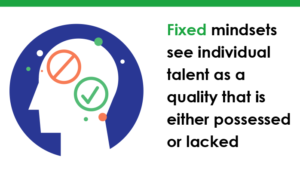
People with fixed mindsets view talent as a quality they either possess or lack. In a bubble, that isn’t inherently a bad thing. Those who see themselves as talented with high levels of natural skill can excel throughout their careers and contribute tremendously to businesses. The issue is that many people with fixed mindsets don’t actually reach their full potential. They believe they are good at X and bad at Y, so accept roles and tasks only tailored to X. As a result, these individuals often rely on their natural talent rather than high effort, stick to old methods, and maintain a similar level of production throughout their careers.
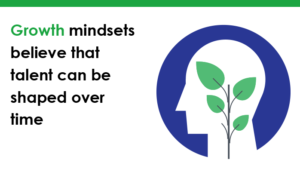
In contrast, people with growth mindsets believe their talent and skill sets can be shaped over time. These individuals enjoy challenges, strive to learn, and seek potential for developing further in their roles and careers. According to Forbes, they learn from setbacks, understanding that they can grow from their mistakes. Think of those who always have their eye on a future promotion or regularly attend professional development sessions, industry conferences, and meetup groups, asking questions along the way. With this mentality, employees with growth mindsets are often seen as the hardest working and most dedicated.
The Right Mindset for Your Hiring
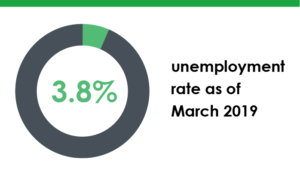
Distinguishing between fixed and growth mindsets is critical when considering your company’s hiring practices and strategy. Today’s low unemployment rate of 3.8% (even lower in hot industries like Finance and IT) means it’s harder than ever to find qualified talent to fill your open roles. This trend has been getting progressively worse for a decade, and shifting toward a growth mindset is an effective way of combating the pain points of the modern market.
A hiring manager with a fixed mindset is likely to seek out “unicorn” candidates whose credentials and past accomplishments are perfect for the position’s requirements. Unfortunately, such candidates either don’t exist in the open market or will take months to find, leaving roles open for so long it negatively impacts the bottom line. Further, Dweck’s research of Fortune 1000 companies found that encouraging fixed mindsets makes employees feel less valued and more worried about failing, meaning they pursue fewer innovative projects outside their wheelhouse. These employees often digest feedback as personal attacks since they believe their intelligence and skills are static and intrinsically linked to who they are.
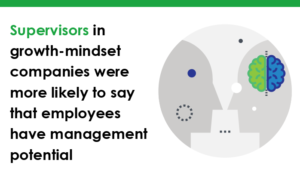
On the other hand, a hiring manager with a growth mindset believes strongly in training and hiring for potential. They are more inclined to consider promoting internal employees, and open up their view of the available talent pool by considering candidates who are 85% qualified for a role but could be trained into the perfect candidate. This more realistic view of hiring is often far more fruitful, especially when a hiring manager is backed by an organization that supports training and professional development. Whether you’re a hiring manager or are hiring one, fostering a growth mindset can make a big impact.
Growth mindsets in hiring should extend past just the hiring managers and through to the employees who are hired. Seeking out candidates who also embody growth mindsets creates more value in the long run. Such employees are innovative, collaborative, and committed to learning and growing in your company. They seek out opportunities for themselves, for the tasks at hand, and for your business. According to Dweck, supervisors in growth-mindset companies expressed significantly more positive views about their employees and were more likely to say they had management potential. This can work wonders for your retention and succession planning, especially when the entire team is on the same page.
Applying a Growth Mindset Throughout Your Business
There’s a reason why growing companies feel so exciting to be a part of. Strategic growth, or growth with specific direction and intent, can do wonders, but it requires dedication. Otherwise, attempting to grow a business merely for the sake of growing creates inconsistencies and more problems than solutions. Proper growth requires strong leadership and talent that buys into the same strategies, values, and processes.
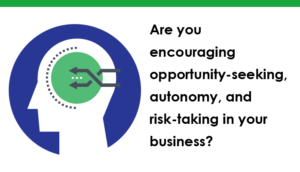
Take growth mindsets a step further by applying them throughout your business. Weave it into your culture, into the fabric of your company, so it’s present in every department, meeting, and handbook. Use companies like Apple, Amazon, and Netflix as motivation, and make a growth mindset your company’s guiding light and force for change. Look to the future, and ask: Where will my business be in five years? What innovations and people are we investing in today in order to reach the goals of tomorrow? Am I encouraging opportunity-seeking, autonomy, and risk-taking in the employees who report to me? Asking questions like these will put you on the right path to successful business development and expansion with a team of inspired and dedicated employees.
Leveraging a Growth Mindset
Consider it this way: a fixed mindset maintains, while a growth mindset seeks more. Fixed mindsets can be ok in certain cases, like if you just need to stabilize a business or department over a certain quarter or year. However, when you’re seeking higher innovation, happier employees, and a more inspired culture, a growth mindset can work wonders. Shift your mindset in hiring and throughout your business, and you can reap those rewards.
Are you interested in finding talent with growth mindsets? Want to chat about this further? Send us an email today!
Related Articles
The Secret to Staying Positive During Change in the Workplace
